高一英语优质课件:Unit1 Advertising-Grammar(牛津译林版必修4)
文档属性
| 名称 | 高一英语优质课件:Unit1 Advertising-Grammar(牛津译林版必修4) |

|
|
| 格式 | zip | ||
| 文件大小 | 331.8KB | ||
| 资源类型 | 教案 | ||
| 版本资源 | 牛津译林版 | ||
| 科目 | 英语 | ||
| 更新时间 | 2012-05-16 00:00:00 | ||
图片预览



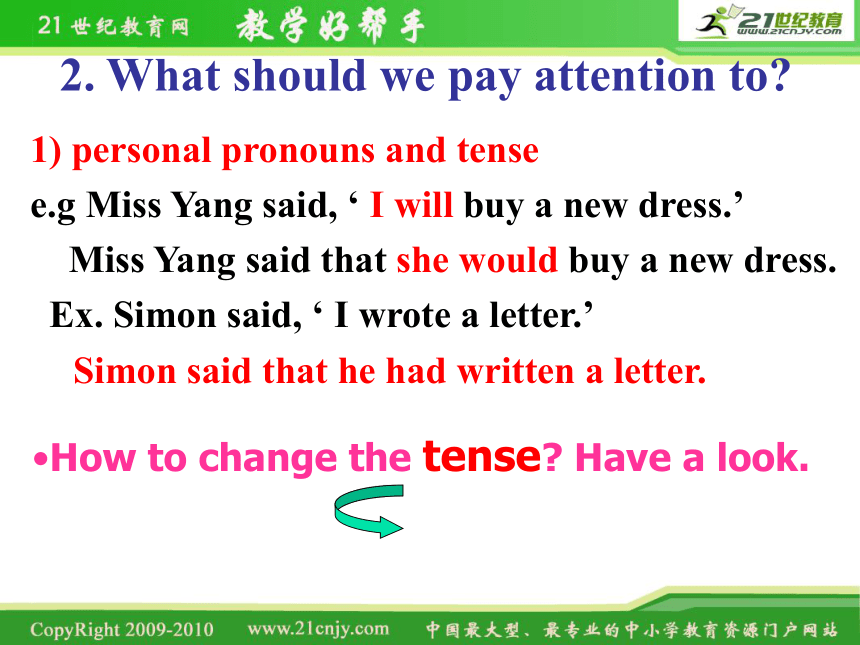
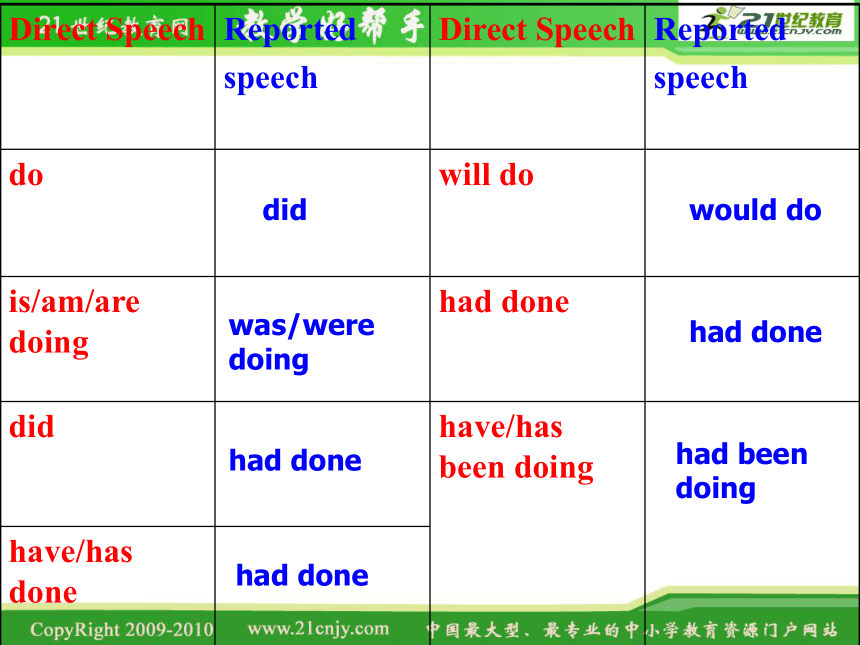
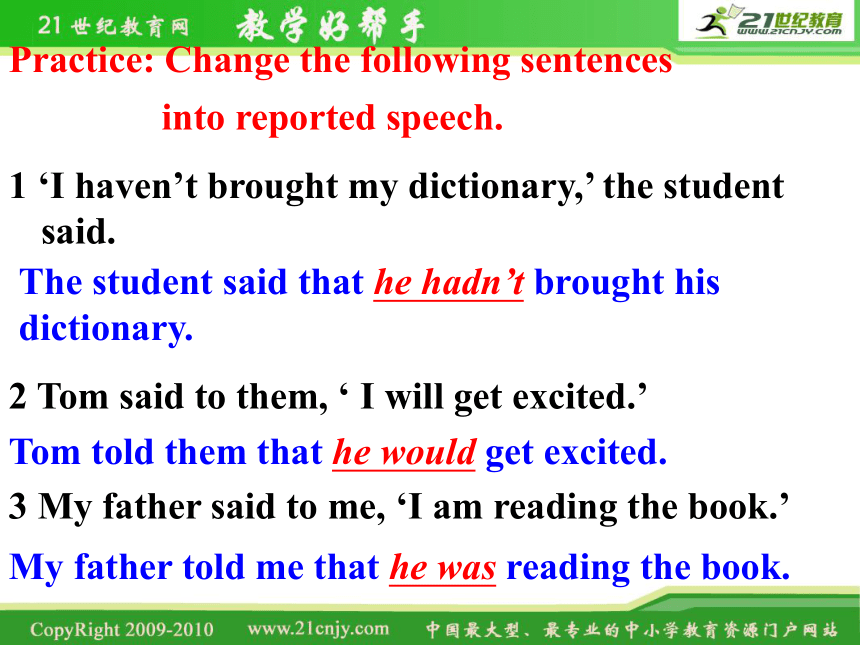

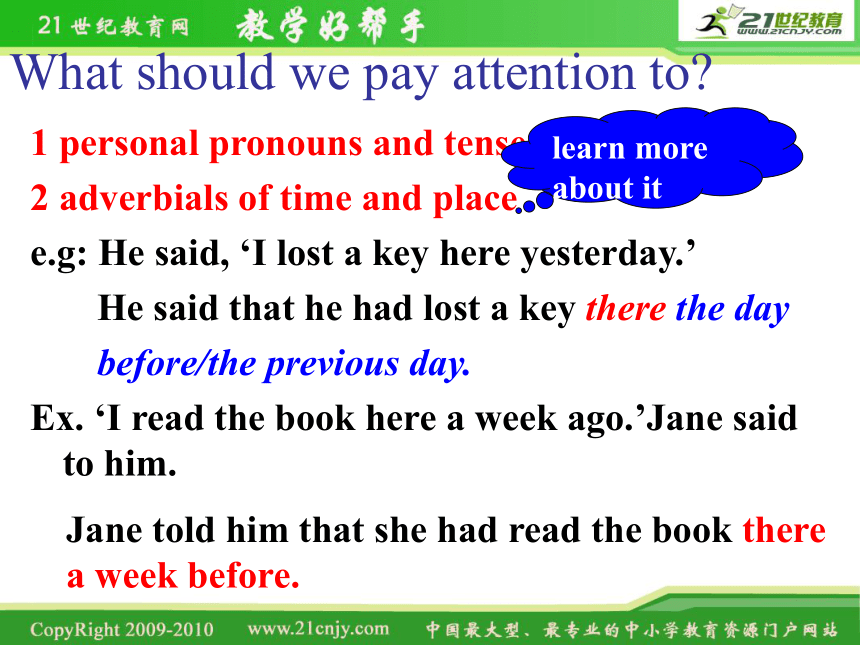
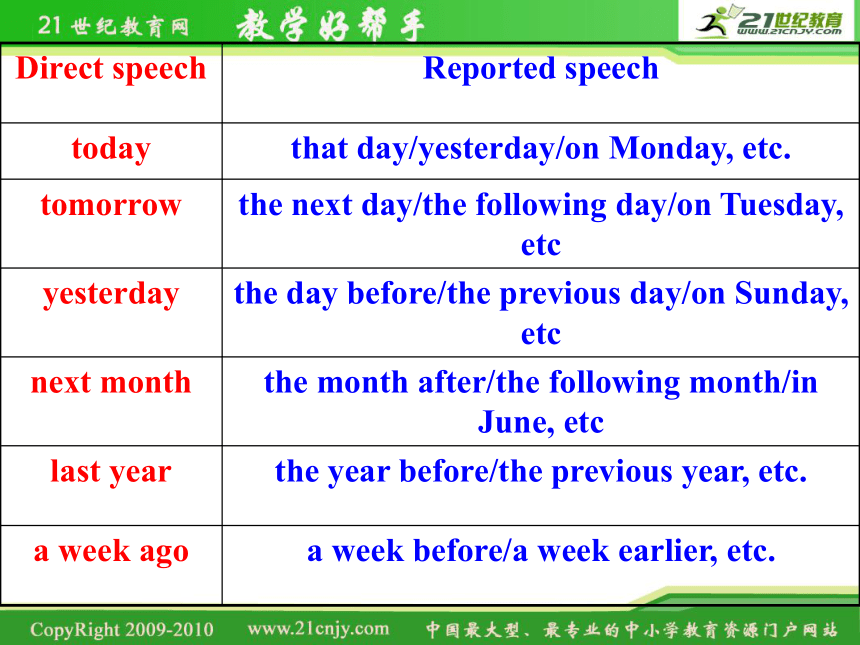
文档简介
(共28张PPT)
Lead-in
T: What did you eat this morning
Tom: I ate …
T: What did Tom say, Jack
Jack: He said he ate …
direct speech
reported speech
1. How to Change the direct speech into reported speech
She said, ‘This film is quite interesting.’
‘Finish the project tomorrow.’ he said to me.
She said that that film was quite interesting.
He asked me to finish the project the next day.
(Change what has been said to an object clause or
an infinitive phrase.)
2. What should we pay attention to
1) personal pronouns and tense
e.g Miss Yang said, ‘ I will buy a new dress.’
Miss Yang said that she would buy a new dress.
Ex. Simon said, ‘ I wrote a letter.’
Simon said that he had written a letter.
How to change the tense Have a look.
Direct Speech Reported
speech Direct Speech
Reported
speech
do will do
is/am/are doing had done
did have/has been doing
have/has done
did
was/were doing
had done
had done
would do
had done
had been doing
Practice: Change the following sentences
into reported speech.
1 ‘I haven’t brought my dictionary,’ the student said.
2 Tom said to them, ‘ I will get excited.’
3 My father said to me, ‘I am reading the book.’
The student said that he hadn’t brought his dictionary.
Tom told them that he would get excited.
My father told me that he was reading the book.
Tips:
‘Light travels at a great speed,’ said
the teacher.
The teacher said that light travels
at a great speed.
What should we pay attention to
1 personal pronouns and tense
2 adverbials of time and place
e.g: He said, ‘I lost a key here yesterday.’
He said that he had lost a key there the day
before/the previous day.
Ex. ‘I read the book here a week ago.’Jane said to him.
Jane told him that she had read the book there
a week before.
learn more about it
Direct speech Reported speech
today that day/yesterday/on Monday, etc.
tomorrow the next day/the following day/on Tuesday, etc
yesterday the day before/the previous day/on Sunday, etc
next month the month after/the following month/in June, etc
last year the year before/the previous year, etc.
a week ago a week before/a week earlier, etc.
Practice: Change the following sentences
into reported speech.
1 ‘I will come and see you again this evening, Tom.’ he said.
2 ‘I will come here again today,’ she said.
3 The doctor said to the patient, ‘You will have to wait till 3 pm tomorrow.’
He told Tom that he would go and see him again
that evening.
She said that she’d go there again that day.
The doctor told the patient that he would have to
wait till 3 pm the next day.
What should we pay attention to
1 personal pronouns and tense
2 adverbials of time and place
3 other cases
Directed speech Reported speech
this that
these those
come go
Ex: Page 9
Possible answers:
(1) was (2) would be (3) had read
(4)that (5)would (6) had bought
(7) that (8) would (9) those
(10) her
Grammar and Usage (2)
How to change direct speech into reported speech
Sentence structure
1 personal pronouns and tense
2 adverbials of time and place
3 other cases
Revision:
How to use reported speech to report:
statements
questions
imperative sentences
that
whether/if
wh-words
What words can be used to report statements, questions, and imperative sentences
reporting verb + O + (not) + to do
Statements
yes/no Questions
wh-questions
Imperative sentences
Statements:
She said, ‘Ads are an important part of our lives.’
She said that ads are an important part of our lives.
‘There are two main types of ads,’ the writer said to us.
The writer told us that there are two main types of ads.
*More reporting words:
‘PSAs are often placed for free,’ the writer said.
The writer explained that PSAs are often placed for free.
advise/agree/ explain /insist /promise/remind/suggest/warn
Can you give more examples
Practice: Change the following sentences
into direct speech.
1 Tom suggested that we should translate the book into English.
2 The student explained that he really didn’t know he had to finish the work a week before.
3 The teacher promised that he would give his students a few holidays at the end of that month.
Tom said, ‘You’d better translate the book into English.’
The student said, ‘ I really don’t know I must finish the work a week ago.’
The teacher said, ‘I will give my students a few holidays at the end of this month.’
Questions:
‘Are all ads playing tricks on us ’I asked her.
I asked her whether/if all ads are playing tricks on us.
*I asked her, ‘How can that be true ’
I asked her how that could be true.
“Where did you find the ads for jobs abroad ’Bill asked.
Bill asked where I had found the ads for jobs abroad.
Practice: Change the following sentences
into reported speech.
1 My mother asked me, ‘Do you want to go to the Great Wall with me ’
2 The teacher asked the boy, ‘How many pages have you read today ’
3 I asked Li Ying, ‘ Where and when were you born ’
My mother asked me whether I wanted to go to the
Great Wall with her.
The teacher asked the boy how many pages he had
read that day.
I asked Li Ying where and when he was born.
Imperative sentences:
*To report imperative sentences, we use the structure: reporting verb+object+(not)+to-infinitive.
‘Don’t worry,Mickey,’ Jen said.
Jen asked Mickey not to worry.
*other verbs can be used in this structure
‘Don’t believe every ad you read,’ Lily said to me.
Lily advised me not to believe every ad I read.
reporting verb
object
(not)
to-infinitive
advise encourage invite remind warn
Let’s do some Ex for consolidation!You can do it well!
The teacher said to me, ‘Don’t forget to learn the
dialogue by heart.’
My brother said, ‘ Come here at once.’
My father said to us, ‘Don’t throw the waste paper everywhere.’
The teacher reminded me not to forget to learn the dialogue by heart.
My brother ordered me to go there at once
My father warned us not to throw the waste
paper everywhere.
Ex. Page 11
A:
2 asked how it could help him remember English words.
3 ask whether/if it taught listening and speaking.
4 asked what the designer would do if she was not satisfied with soft ware.
5 asked whether /if it was easy to ues.
Ex. Page 11
B:
2 encourages us to use interesting and attractive photos.
3 recommends that we (should) use eye-catching logos.
4 suggests that we (should) make the slogans short and easy to remember.
5 tells us to make good use of colours to attact people’s attention.
Homework
1 Finish Ex on Page 92.
2 Make good preparation for Task part.
Thanks!
Bye-bye!
Lead-in
T: What did you eat this morning
Tom: I ate …
T: What did Tom say, Jack
Jack: He said he ate …
direct speech
reported speech
1. How to Change the direct speech into reported speech
She said, ‘This film is quite interesting.’
‘Finish the project tomorrow.’ he said to me.
She said that that film was quite interesting.
He asked me to finish the project the next day.
(Change what has been said to an object clause or
an infinitive phrase.)
2. What should we pay attention to
1) personal pronouns and tense
e.g Miss Yang said, ‘ I will buy a new dress.’
Miss Yang said that she would buy a new dress.
Ex. Simon said, ‘ I wrote a letter.’
Simon said that he had written a letter.
How to change the tense Have a look.
Direct Speech Reported
speech Direct Speech
Reported
speech
do will do
is/am/are doing had done
did have/has been doing
have/has done
did
was/were doing
had done
had done
would do
had done
had been doing
Practice: Change the following sentences
into reported speech.
1 ‘I haven’t brought my dictionary,’ the student said.
2 Tom said to them, ‘ I will get excited.’
3 My father said to me, ‘I am reading the book.’
The student said that he hadn’t brought his dictionary.
Tom told them that he would get excited.
My father told me that he was reading the book.
Tips:
‘Light travels at a great speed,’ said
the teacher.
The teacher said that light travels
at a great speed.
What should we pay attention to
1 personal pronouns and tense
2 adverbials of time and place
e.g: He said, ‘I lost a key here yesterday.’
He said that he had lost a key there the day
before/the previous day.
Ex. ‘I read the book here a week ago.’Jane said to him.
Jane told him that she had read the book there
a week before.
learn more about it
Direct speech Reported speech
today that day/yesterday/on Monday, etc.
tomorrow the next day/the following day/on Tuesday, etc
yesterday the day before/the previous day/on Sunday, etc
next month the month after/the following month/in June, etc
last year the year before/the previous year, etc.
a week ago a week before/a week earlier, etc.
Practice: Change the following sentences
into reported speech.
1 ‘I will come and see you again this evening, Tom.’ he said.
2 ‘I will come here again today,’ she said.
3 The doctor said to the patient, ‘You will have to wait till 3 pm tomorrow.’
He told Tom that he would go and see him again
that evening.
She said that she’d go there again that day.
The doctor told the patient that he would have to
wait till 3 pm the next day.
What should we pay attention to
1 personal pronouns and tense
2 adverbials of time and place
3 other cases
Directed speech Reported speech
this that
these those
come go
Ex: Page 9
Possible answers:
(1) was (2) would be (3) had read
(4)that (5)would (6) had bought
(7) that (8) would (9) those
(10) her
Grammar and Usage (2)
How to change direct speech into reported speech
Sentence structure
1 personal pronouns and tense
2 adverbials of time and place
3 other cases
Revision:
How to use reported speech to report:
statements
questions
imperative sentences
that
whether/if
wh-words
What words can be used to report statements, questions, and imperative sentences
reporting verb + O + (not) + to do
Statements
yes/no Questions
wh-questions
Imperative sentences
Statements:
She said, ‘Ads are an important part of our lives.’
She said that ads are an important part of our lives.
‘There are two main types of ads,’ the writer said to us.
The writer told us that there are two main types of ads.
*More reporting words:
‘PSAs are often placed for free,’ the writer said.
The writer explained that PSAs are often placed for free.
advise/agree/ explain /insist /promise/remind/suggest/warn
Can you give more examples
Practice: Change the following sentences
into direct speech.
1 Tom suggested that we should translate the book into English.
2 The student explained that he really didn’t know he had to finish the work a week before.
3 The teacher promised that he would give his students a few holidays at the end of that month.
Tom said, ‘You’d better translate the book into English.’
The student said, ‘ I really don’t know I must finish the work a week ago.’
The teacher said, ‘I will give my students a few holidays at the end of this month.’
Questions:
‘Are all ads playing tricks on us ’I asked her.
I asked her whether/if all ads are playing tricks on us.
*I asked her, ‘How can that be true ’
I asked her how that could be true.
“Where did you find the ads for jobs abroad ’Bill asked.
Bill asked where I had found the ads for jobs abroad.
Practice: Change the following sentences
into reported speech.
1 My mother asked me, ‘Do you want to go to the Great Wall with me ’
2 The teacher asked the boy, ‘How many pages have you read today ’
3 I asked Li Ying, ‘ Where and when were you born ’
My mother asked me whether I wanted to go to the
Great Wall with her.
The teacher asked the boy how many pages he had
read that day.
I asked Li Ying where and when he was born.
Imperative sentences:
*To report imperative sentences, we use the structure: reporting verb+object+(not)+to-infinitive.
‘Don’t worry,Mickey,’ Jen said.
Jen asked Mickey not to worry.
*other verbs can be used in this structure
‘Don’t believe every ad you read,’ Lily said to me.
Lily advised me not to believe every ad I read.
reporting verb
object
(not)
to-infinitive
advise encourage invite remind warn
Let’s do some Ex for consolidation!You can do it well!
The teacher said to me, ‘Don’t forget to learn the
dialogue by heart.’
My brother said, ‘ Come here at once.’
My father said to us, ‘Don’t throw the waste paper everywhere.’
The teacher reminded me not to forget to learn the dialogue by heart.
My brother ordered me to go there at once
My father warned us not to throw the waste
paper everywhere.
Ex. Page 11
A:
2 asked how it could help him remember English words.
3 ask whether/if it taught listening and speaking.
4 asked what the designer would do if she was not satisfied with soft ware.
5 asked whether /if it was easy to ues.
Ex. Page 11
B:
2 encourages us to use interesting and attractive photos.
3 recommends that we (should) use eye-catching logos.
4 suggests that we (should) make the slogans short and easy to remember.
5 tells us to make good use of colours to attact people’s attention.
Homework
1 Finish Ex on Page 92.
2 Make good preparation for Task part.
Thanks!
Bye-bye!
